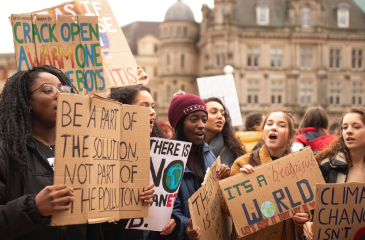This post is part of our "Bioethics in Focus" series featuring experts from the Center for Bioethics community.
For the last several years, my focus in bioethics has been to work on the ethics of health care in clinical settings. I have been asking: “What implications does climate change have for clinical ethics?”. I see a pressing need for US health-care institutions to adapt to the global health challenges driven by climate change. In doing so, my colleagues and I are still learning. Here are my current thoughts on these issues:
While writing an article on health care policy and the environment in 2019, my coauthors and I were stunned to realize ethics has changed radically in the last few decades. It became clear that a principle, formerly a special interest of a few, has risen to a central status in any society hoping to sustain itself.
The principle has been expressed in many ways: it is the idea that humans, as a living, conscious species, share an interest in survival with all other living species, many conscious, many not. This principle—sometimes labeled respect for nature—can be expressed as a strong sense of biological interconnection and interdependence with the biosphere or the global ecosystem.
Extraordinary and accelerating changes in the circumstances of humanity have transformed this sense of interconnection from controversial to essential [McNeill]. In speaking up for nature, we are not merely isolated voices in the social network. Respect for nature has taken its place alongside such principles as respect for persons, fairness, and avoiding harm to others. Ethics is changing - has changed.
Change in ethics is normal. Societies tend to recycle ethical principles over time. But, the rise of respect for nature is unusually important. It is striking partly because its emergence has not been driven so much by conflicts among people and classes, but by the rise of a scientific understanding of humans as a species whose overall conduct is crucial to the fate of the living planet. We are now in the Anthropocene and our ethics must go beyond bioethics to an ethics of the biome [Miles and Craddock].
Spurred by our nature-neglecting modernity, humans now face self-made existential challenges constituted by such factors as climate change, the sixth great extinction [Kolbert], and the need for good lives for nearly eight billion people, many of whom are in great need.
This change in culture runs deep. Although a few societies — notably Native American ones — have elevated respect for nature here and there in history, this principle isn’t much evident in an important anthropological survey of cultures [Brown]. It’s missing in much of history and religion [Chakrabarty; White]. Most of the great works of moral philosophy have neglected our interconnection with Earth’s ecology. One need only sample a few of the classic ethics texts from Aristotle on; most begin by separating humans from the larger natural world [Sartwell]. General moral theories, such as utilitarianism, adapt uneasily to the needs of nature [Singer]. Significant for the practice of bioethics consultation, it is neither in the “common morality” basic to standard approaches to bioethics [Beauchamp and Childress], nor in the codes of ethics of clinical and public health professions [Jameton and Pierce].
This change has broad ripple effects. The problem of making ethical judgments in specific decisions and policies has always involved complexity and required some special knowledge and study. But, now the challenges of philosophical ethics have become more complex and urgent.
Respect for nature is not the only complicating principle now inhabiting the ethics living room. Americans are experiencing a renewed awareness of the regrettable US history of crimes against the equality of peoples. But this is not merely an American problem. Those working on climate change perceive this sense of injustice in a global framework [CSO Equity Review 2021]. The intense global injustice of climate change—that those least responsible are suffering the most—is obvious to everyone. Even so, at the 26th Conference of Parties at Glasgow earlier in November, it proved extremely difficult to devise a global agreement that both rapidly reduces greenhouse gas emissions and is judged to be fair enough for all to agree.
With the combined new factors of nature and global justice applicable to every important judgment and policy, every human achievement and aspiration now has to be balanced against global justice and its environmental costs in the long term. Few great human enterprises can survive this new balance without scars. As Stephen Gardiner put it, we are in a “Perfect Moral Storm” [2013].
Locally, many at the University of Minnesota are working on these ethical challenges in supporting these two principles of equality and sustainability. The widespread concern for community involvement and struggles for identity and freedom from unequal treatment are evident everywhere on campus. Similarly, wide concern for sustainability can be found on campus as well, such as in the Grand Challenges Curriculum, interprofessional “planetary health” work [Wabnitz et al.], the cross-campus work under the “one health” concept [Cordona et al.], community justice and climate change in policy studies, courses on health and climate change [Moulton], studies of the economics of environmental costs [Polasky], student activism on these issues, sustainability commitments in facilities management, energy infrastructure, architecture, the Institute on the Environment, and many more. See below for a resource list.
I personally feel very challenged intellectually and emotionally by the new combined importance of justice and respect for nature. It is a great challenge to integrate these large and complex principles and apply them reasonably to specific and realistic situations. In working with students and research, there are many opportunities to examine these issues and to foster the professionalism of future graduates working in the professions and skilled occupations.
Yet, there are so many opportunities, and so much complexity, that it is quite difficult to know very much about what is going on, or to have enough expertise even to glean a mere basic understanding of the many vocabularies and specifics. And ironically, while large intellectual enthusiasm for climate justice thrives, this represents a small fraction of the work that needs to be done to mitigate and adapt to accelerating global change.
Moreover, I am realizing that in spending my years in clinical consultation, I was working in something of a bubble [Weintrobe]. Enough people around me agreed about the basic concern for service to patient welfare that my usual method of philosophy for helping to resolve conflicts worked pretty well. I could always step back from the stressful specifics of a clinical situation and turn to the relative calm, rationality, and distant perspective of basic philosophical concepts.
Not so much any more. Moral philosophy is now in some chaos. For instance, I have given several talks on climate justice. All of them have been, to my mind, and I am sure to some of the audience, failures. If rationality is to play a role in building the new cultures and civilizations that can mitigate and adapt to climate change, a synthesis is badly needed of basic philosophical concepts that can combine global climate concerns together with the important needs of local justice.
The truth is, I am something of a pessimist. I am one of those worried that the resolutions of Glasgow will turn out to be neither transformative enough to mitigate climate change nor fair enough to engage most of the world in successful promise keeping. Yet, that pessimism has not left me unmotivated, and I have to ask: “Why not?”
I think it must be this: As a philosopher, the scope and depth of the world’s challenges is exciting. Amazingly creative and new ideas about tough realities are bubbling up everywhere. Behind my own distress at witnessing the increasing suffering and losses of the world’s living creatures is the awesome excitement of new ideas and their potential power to make the world anew. I believe this is a realm in which bioethics can help to find humane and equitable solutions to some of our greatest challenges.
A Brief Sample of UMNTC Climate Change Resources
- Twin Cities Sustainability Committee. December 2011. UMN CAP: Climate Action Plan
- Center for Science, Technology, and Environmental Policy, Hubert H. Humphrey School of Public Affairs
- Climate Change Resources Page
- Energy Transition Lab
- Engineers Without Borders, University of Minnesota Chapter
- Environmental Humanities Initiative
- Environmental and Resource Economics
- Global One Health Initiative. College of Veterinary Medicine
- Grand Challenges Curriculum
- Health Students for a Healthy Climate
- Institute on the Environment (IonE)
- Midwest Climate Adaptation Science Center will be housed at the U of M’s Institute on the Environment (IonE) in close collaboration with the College of Food, Agricultural, and Natural Resource Sciences (CFANS); Extension; and the Natural Resources Research Institute (NRRI).
- Minnesota Institute for Sustainable Agriculture (MISA)
- MnTAP (Minnesota Technical Assistance Program) Pollution Prevention for Healthcare Facilities
- Planetary Health. School of Nursing
- Students for Climate Justice
- Swain Climate Policy Series
- UMN Sustainability Campaign
References
- Beauchamp, Tom L., and James F. Childress. 2019. Principles of Biomedical Ethics. 8th ed. New York: Oxford University Press
- Brown, D. 1991. Human Universals. McGraw-Hill Companies.
- Cardona, Carol, Dominic A Travis, Kavita Berger, Gwenaële Coat, Shaun Kennedy, Clifford J Steer, Michael P Murtaugh, and P Sriramarao. 2015. "Advancing one health policy and implementation through the concept of one medicine one science." Global advances in health and medicine 4 (5): 50-54.
- Chakrabarty, Dipesh. 2021. Climate of History in a Planetary Age. University of Chicago Press.
- CSO Equity Review. (2021) A Fair Shares Phase Out: A Civil Society Equity Review on an Equitable Global Phase Out of Fossil Fuels. Manila, London, Cape Town, Washington, et al.: CSO Equity Review Coalition. https://civilsocietyreview.org/report2021/
- Gardiner, S.M. 2013. A Perfect Moral Storm: The Ethical Tragedy of Climate Change. Oxford University Press..
- Jameton, Andrew, and Jessica Pierce. 2021. "Can Clinical Ethics Survive Climate Change?" Perspect Biol Med 64 (4): 511-540.
- Kolbert, Elizabeth. 2014. The Sixth Extinction: An Unnatural History. Henry Holt and Company.
- McNeill, John Robert. 2016. The great acceleration. Harvard University Press.
- Miles, S. H., and Susan Craddock. 2018. "Ethics for the Anthropocene Epoch." In Encyclopedia of the Anthropocene, 21-27. Oxford: Elsevier.
- Moulton, Anthony D. 2021. "Congress and Health Advocates Can Build a Climate Change–Adapted Health Sector." American Journal of Public Health 111 (4): 568-570. https://doi.org/10.2105/ajph.2021.306172.
- Polasky, Stephen, Catherine L Kling, Simon A Levin, Stephen R Carpenter, Gretchen C Daily, Paul R Ehrlich, Geoffrey M Heal, and Jane Lubchenco. 2019. "Role of economics in analyzing the environment and sustainable development." Proceedings of the National Academy of Sciences 116 (12): 5233-5238.
- Sartwell, Crispin. 2021. "Humans Are Animals. Let’s Get Over It." NYT. https://www.nytimes.com/2021/02/23/opinion/humans-animals-philosophy.html.
- Wabnitz, Katharina-Jaqueline, Sabine Gabrysch, Renzo Guinto, Andy Haines, Martin Herrmann, Courtney Howard, Teddie Potter, Susan L. Prescott, and Nicole Redvers. 2020. "A pledge for planetary health to unite health professionals in the Anthropocene." The Lancet 396 (10261): 1471-1473. https://doi.org/10.1016/s0140-6736(20)32039-0.
- Weintrobe, Sally. 2020. "Moral injury, the culture of uncare and the climate bubble." Journal of Social Work Practice 34 (4): 351-362. https://doi.org/10.1080/02650533.2020.1844167. https://doi.org/10.1080/02650533.2020.1844167.
- White, Lynn. 1967. "The religious roots of our ecological crisis." Science 155:1203-207.



